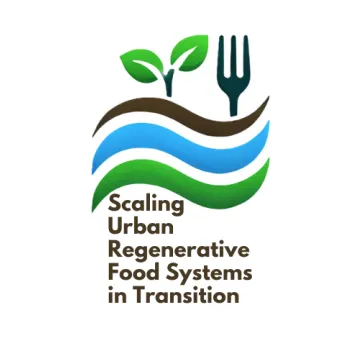SURFIT
Scaling Urban Regenerative Food Systems In Transition

© SURFIT
- Category
- Project
- Call
- DUT Call 2022
- Duration
- –
- Project coordinator
- Maastricht University
One of the key challenges for sustainable urban food systems is to shorten the food supply chain by connecting food producers directly to consumers locally, or regionally. Sustainable food networks (SFNs) try to achieve this ambition, but struggle with scaling their often isolated and marginal position. The SURFIT project focuses on the concept of ‘catalysers’ to jointly experiment with and learn about scaling process of SFNs.
The following research questions are guiding the work in the project:
(1) What examples of catalysers can be found in European cities?
(2) What are the underlying principles that make them effective? and
(3) What are the key barriers to embedding catalysers and how can they be overcome?
SURFIT will bring together SFNs, local policymakers and a multidisciplinary set of researchers from four mid-size cities to jointly conduct transdisciplinary research in Urban Food Labs (UFLs) with an urban living lab approach. The aim of this research is to explore, understand and engage in how catalysers can be designed to scale SFNs for systemic transitions. The project will deliver design principles and reflexive guidance in embedding catalysers to advance and scale SFNs.
The project takes place in Maastricht (NL), Malmo (S), Krakow (PL), Trento (I).
Impact and benefits of the SURFIT Project
Societal impact
SURFIT directly addresses pressing societal challenges around urban food security, social equity, and environmental sustainability by strengthening and scaling Sustainable Food Networks (SFNs). The project aims to:
- Improve access to affordable, healthy, and culturally appropriate food for all urban residents, including low-income and marginalized communities—thereby tackling urban "food deserts" and food injustice.
- Empower local food producers and social enterprises, offering economic security and fairer value distribution within the food system.
- Enhance community cohesion by supporting participatory food initiatives rooted in local needs, knowledge, and values.
Environmental and circularity benefits
SURFIT supports a transition toward circular urban food systems by:
- Promoting short food supply chains that reduce transport emissions, food loss, and packaging waste.
- Encouraging practices like community composting, surplus food redistribution, and urban agriculture to close resource loops.
- Integrating SFNs with other urban resource systems (e.g., waste, water, and energy), boosting urban circularity and ecological resilience.
Scientific and methodological innovation
SURFIT advances scientific understanding in several key ways:
- It introduces and tests the novel concept of "catalysers" as systemic enablers of food system transitions—grounded in real-world experimentation and theory from transition studies, food sociology, and the circular economy.
- It develops a conceptual framework and design principles for catalysers, offering tools for both academic inquiry and applied use.
- It applies a transdisciplinary, living lab methodology (Urban Food Labs), co-producing knowledge through collaboration between researchers, policymakers, and civil society actors.
Policy and governance benefits
SURFIT has strong potential to influence urban food policies and governance frameworks:
- By demonstrating what works in different city contexts, the project will produce actionable insights and policy recommendations for embedding SFNs in municipal strategies.
- It provides a model for inclusive, public-private collaboration in the co-design and implementation of sustainable food systems.
- It supports the development of new regulatory and financial instruments that incentivize circular, just, and regenerative food systems.
European and international relevance
While rooted in four mid-sized European cities, SURFIT’s results will be broadly applicable:
- The design principles, snapshot briefs, and policy tools developed will serve as transferable models for other cities in Europe and beyond.
- By contributing to knowledge on scaling bottom-up sustainability initiatives, the project strengthens Europe’s leadership in implementing the European Green Deal, the Farm to Fork Strategy, and the Circular Economy Action Plan.
Italy
The Netherlands
Poland
Sweden
Comune di Trento, Lunds Universitet, Stiftelsen Varldsnaturfonden WWF, Sveriges Lantbruksuniversitet, Universita Degli Studi di Trento, Uniwersytet Jagiellonski
Altroconsumo, Associazione CSA Naturalmente In Trentino, Associazione Trentinosolidale Odv, Club per l’UNESCO di Trento Cooperatie Gedeelde Weelde B.A. Farmacie Comunali s.p.a. Fundacja Targ Pietruszkowy Gemeente Maastricht Gmina Miejska Kraków, Zarzad Zieleni Miejskiej w Krakowie LimBio LOCOtuinen de Oogst C.V. Malmö Food Council Skanes Livsmedelsakademi, Slow Food Trentino Alto Adige Suftirol Sweden Foodtech AB Voedsel.Coop
Links
Contact
Christian Scholl
christian.scholl@maastrichtuniversity.nl